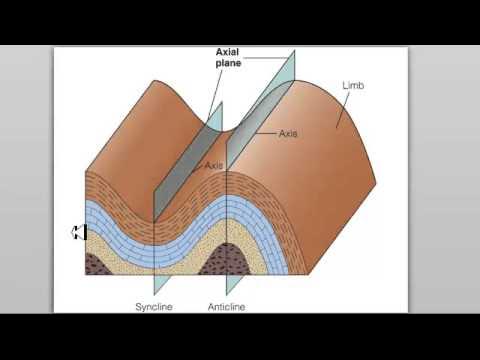TYPES OF STRESS THAT INFLUENCE ROCK BEHAVIOR
Summary
TLDRThe video explores four key types of geological stress: compression, tension, shearing, and confining stress. Compression causes rocks to push against each other, forming mountains through horizontal or vertical changes. Tension, the opposite force, pulls rocks apart and is linked to the breakup of Pangaea. Shearing stress involves rocks rubbing against each other, often leading to earthquakes, while confining stress applies pressure from all sides, potentially creating fractures and cavities in the Earth's crust. The video provides a clear overview of how these stresses shape our planet.
Takeaways
- 😀 Stress is a force that can push or pull on geological plates, influencing their behavior.
- 🪨 There are four main types of stress in geology: compression, tension, shear, and confining stress.
- ⬇️ Compression stress squeezes rocks together, leading to horizontal or vertical changes in the crust.
- ⛰️ Mountains often form as a result of high-impact compression stress from colliding tectonic plates.
- 📏 Tension stress pulls rocks apart and is considered the opposite of compression stress.
- 🌍 Some scientists suggest that tension stress contributed to the breakup of the ancient supercontinent Pangea.
- ↔️ Shear stress causes rocks to slide past each other in opposite directions, which can trigger earthquakes.
- 🔒 Confining stress applies force from all sides of the crust, potentially causing internal fractures.
- 💥 Excessive confining stress can lead to the formation of holes or cavities within the Earth's crust.
- 👍 Understanding these types of stress is crucial for comprehending geological processes and earth dynamics.
Q & A
What is stress in geological terms?
-In geological terms, stress refers to the force that pushes and pulls on rocks, causing them to behave or deform in various ways.
What are the four types of stress discussed in the video?
-The four types of stress are compression, tension, shear, and confining stress.
How does compression stress affect rocks?
-Compression stress causes rocks to push or squeeze against one another, often resulting in horizontal or vertical orientation.
What happens during horizontal compression stress?
-During horizontal compression stress, the crust can thicken or shorten.
What occurs under vertical compression stress?
-Under vertical compression stress, the crust can break or 'clean out.'
What geological feature is a result of high impact compression stress?
-Mountains are often formed as a result of high impact compression stress when two tectonic plates collide.
What is tension stress, and how does it affect rocks?
-Tension stress is the force that pulls rocks apart, acting as the opposite of compression stress. It is believed to have contributed to the breakup of the ancient supercontinent Pangaea.
What is shear stress, and what effect does it have?
-Shear stress forces rocks to rub against each other as they move in opposite directions, which can create friction and lead to earthquakes.
What characterizes confining stress?
-Confining stress involves forces applied to all sides of the crust, which can cause the rocks to fracture from the inside if the stress exceeds their strength.
What potential geological feature can result from confining stress?
-Confining stress can cause holes in the earth's crust due to the hollowing out of the interior.
Outlines

This section is available to paid users only. Please upgrade to access this part.
Upgrade NowMindmap

This section is available to paid users only. Please upgrade to access this part.
Upgrade NowKeywords

This section is available to paid users only. Please upgrade to access this part.
Upgrade NowHighlights

This section is available to paid users only. Please upgrade to access this part.
Upgrade NowTranscripts

This section is available to paid users only. Please upgrade to access this part.
Upgrade Now5.0 / 5 (0 votes)





